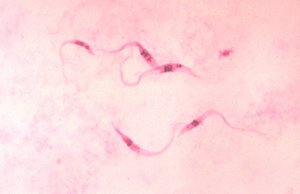Trypanosome
|
|
| Trypanosomes | ||||||||
|---|---|---|---|---|---|---|---|---|
 Photomicrograph of Trypanosoma cruzi parasites (Chagas disease pathogen). | ||||||||
| Scientific classification | ||||||||
| ||||||||
| Genera | ||||||||
|
Blastocrithidia |
The Trypanosomatidae are a group of kinetoplastid protozoa, which are exclusively parasitic. They are distinguished by having only a single emergent flagellum. Trypanosomes alternate between insect and vertebrate hosts, and are responsible for some human diseases, including sleeping sickness (by Trypanosoma brucei), Chagas disease (by Trypanosoma cruzi), and leishmaniasis (by Leishmania).
Trypanosomes take on several different forms during their life-cycle. In the trypanosome stage, the flagellum runs forwards along the side of the cell, connected to it by an undulating membrane. This occurs in the vertebrate host. In the insect host, the flagellum may emerge at the anterior or posterior, or be absent. Different species may lack some of these stages.de:Trypanosomenfr:Trypanosome Template:Protist-stub
